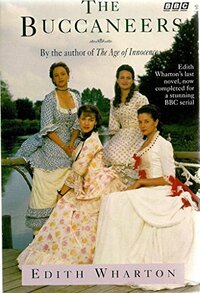Take a photo of a barcode or cover
I was totally absorbed in the story, right up until the point where Wharton's original manuscript ended. I didn't know in advance that that was the part where she left off and Mainwaring took the story up, I only know that's where it became less interesting and a bit unoriginal.
I felt that the truly intended ending was heavily foreshadowed by Wharton: I can't even remember exactly who was present in this scene, but I think it was Miss Testvalley getting a tour of Honourslove from Sir Helmsley Thwarte. She is shown a Holbein painting of an ancestor and it is explained, that he was accused of being Anne Boleyn's lover; he was executed in her presence, before she was executed later herself. The theory being, of course, that Anne Boleyn represents Annabel, and the ancestor falsely accused of being her lover, represents Guy Thwarte. (I feel this theory of foreshadowing is backed up by the scheming of Lizzy and Hector to put Lizzy's sister Mabel in the way of the Duke of Tintagel, as a potential second wife. As though the Duke plays the part of Henry VIII and Mabel as Jane Seymour). Mainwaring's ending is quite happily ever after, which several readers have pointed out, Wharton did NOT do in her stories.
I haven't actually seen anyone else point out this foreshadowed incident, but it immediately jumped out at me as being very obvious. So I will be wondering for the rest of my life exactly how Wharton intended to ruin Annabel and Guy's impending happiness; but ruin I most certainly do think she meant to do.
I felt that the truly intended ending was heavily foreshadowed by Wharton: I can't even remember exactly who was present in this scene, but I think it was Miss Testvalley getting a tour of Honourslove from Sir Helmsley Thwarte. She is shown a Holbein painting of an ancestor and it is explained, that he was accused of being Anne Boleyn's lover; he was executed in her presence, before she was executed later herself. The theory being, of course, that Anne Boleyn represents Annabel, and the ancestor falsely accused of being her lover, represents Guy Thwarte. (I feel this theory of foreshadowing is backed up by the scheming of Lizzy and Hector to put Lizzy's sister Mabel in the way of the Duke of Tintagel, as a potential second wife. As though the Duke plays the part of Henry VIII and Mabel as Jane Seymour). Mainwaring's ending is quite happily ever after, which several readers have pointed out, Wharton did NOT do in her stories.
I haven't actually seen anyone else point out this foreshadowed incident, but it immediately jumped out at me as being very obvious. So I will be wondering for the rest of my life exactly how Wharton intended to ruin Annabel and Guy's impending happiness; but ruin I most certainly do think she meant to do.
slow-paced
Plot or Character Driven:
Character
Strong character development:
No
Loveable characters:
N/A
Diverse cast of characters:
No
Flaws of characters a main focus:
Yes
emotional
informative
reflective
sad
medium-paced
Plot or Character Driven:
Plot
Strong character development:
Complicated
Loveable characters:
Complicated
Diverse cast of characters:
No
Flaws of characters a main focus:
Yes
I have never read anything by Edith Wharton, although I have heard of her. I try to read at least a few classics every year and this seemed like a good choice from the mostly raving reviews. I'm not into romance novels and while this was so much more than just that, it still had a lot of romance in it. I felt the story of the families was interesting, the characters were well-developed and enjoyed the nice touches of humor throughout. I can certainly see why this was made into a mini-series and probably would find it enjoyable to watch.
One of the signs to me of a not so great book, is that I find myself counting how many pages are left and/or staring longingly at other books waiting in que for me on my nightstand. Sadly, that was my experience with this book. The 400+ pages were a slow go and I found myself longing to read something more current.
Edith Wharton died while in the process of writing the book, so the last two "books", as they're termed, are written as an adaptation using Wharton's notes. It was a seamless transition and I did enjoy the ending. Hmm...maybe I mostly enjoyed that it did end! Many loved this, but to me it was just 3 stars.
One of the signs to me of a not so great book, is that I find myself counting how many pages are left and/or staring longingly at other books waiting in que for me on my nightstand. Sadly, that was my experience with this book. The 400+ pages were a slow go and I found myself longing to read something more current.
Edith Wharton died while in the process of writing the book, so the last two "books", as they're termed, are written as an adaptation using Wharton's notes. It was a seamless transition and I did enjoy the ending. Hmm...maybe I mostly enjoyed that it did end! Many loved this, but to me it was just 3 stars.
Not my favorite setting or era, but a very engaging exploration of human nature - the nature of one young American girl in particular. Its fairytale-ish ending is flimsy and transparent, further commentary on the story as a whole. Disillusionment and fantasy exist side-by-side in Wharton's world, and they don't get along very smoothly. One can imagine that reality came crashing in just after the curtain fell.
This definitely reads like an unfinished novel. I feel like the plot and characters were all very underdeveloped. But, I did enjoy the book and the story; I just wish there was more of both.
emotional
slow-paced
Plot or Character Driven:
Character
Strong character development:
Yes
Loveable characters:
Yes
Diverse cast of characters:
No
Flaws of characters a main focus:
No
kind of upset about the idea of this lady finishing it. would of preferred a raw manuscript, couldn't find it
Quite a good read. This edition was completed by an Edith Wharton scholar (based on Mrs. Wharton's notes).
challenging
emotional
funny
lighthearted
medium-paced



